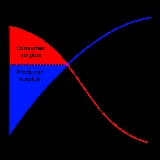
Economic surplus
Overview
Mainstream economics
Mainstream economics is a loose term used to refer to widely-accepted economics as taught in prominent universities and in contrast to heterodox economics...
, economic surplus (also known as total welfare or Marshallian surplus after Alfred Marshall
Alfred Marshall
Alfred Marshall was an Englishman and one of the most influential economists of his time. His book, Principles of Economics , was the dominant economic textbook in England for many years...
) refers to two related quantities. Consumer surplus or consumers' surplus is the monetary gain obtained by consumers because they are able to purchase a product for a price that is less than the highest price that they would be willing to pay. Producer surplus or producers' surplus is the amount that producers benefit by selling at a market price that is higher than the least that they would be willing to sell for.
In some schools of heterodox economics
Heterodox economics
"Heterodox economics" refers to approaches or to schools of economic thought that are considered outside of "mainstream economics". Mainstream economists sometimes assert that it has little or no influence on the vast majority of academic economists in the English speaking world. "Mainstream...
, the economic surplus denotes the total income which the ruling class
Ruling class
The term ruling class refers to the social class of a given society that decides upon and sets that society's political policy - assuming there is one such particular class in the given society....
derives from its ownership of scarce factors of production
Factors of production
In economics, factors of production means inputs and finished goods means output. Input determines the quantity of output i.e. output depends upon input. Input is the starting point and output is the end point of production process and such input-output relationship is called a production function...
, which is either reinvested or spent on consumption.
In Marxian economics
Marxian economics
Marxian economics refers to economic theories on the functioning of capitalism based on the works of Karl Marx. Adherents of Marxian economics, particularly in academia, distinguish it from Marxism as a political ideology and sociological theory, arguing that Marx's approach to understanding the...
, the term surplus may also refer to surplus value
Surplus value
Surplus value is a concept used famously by Karl Marx in his critique of political economy. Although Marx did not himself invent the term, he developed the concept...
, surplus product
Surplus product
Surplus product is a concept explicitly theorised by Karl Marx in his critique of political economy. Marx first began to work out his idea of surplus product in his 1844 notes on James Mill's Elements of political economy...
and surplus labour
Surplus labour
Surplus labour is a concept used by Karl Marx in his critique of political economy. It means labour performed in excess of the labour necessary to produce the means of livelihood of the worker . According to Marxian economics, surplus labour is usually "unpaid labour"...
.
On a standard supply and demand
Supply and demand
Supply and demand is an economic model of price determination in a market. It concludes that in a competitive market, the unit price for a particular good will vary until it settles at a point where the quantity demanded by consumers will equal the quantity supplied by producers , resulting in an...
diagram, consumer surplus is the area (triangular if the supply and demand curves are linear) above the equilibrium price of the good and below the demand
curve.

